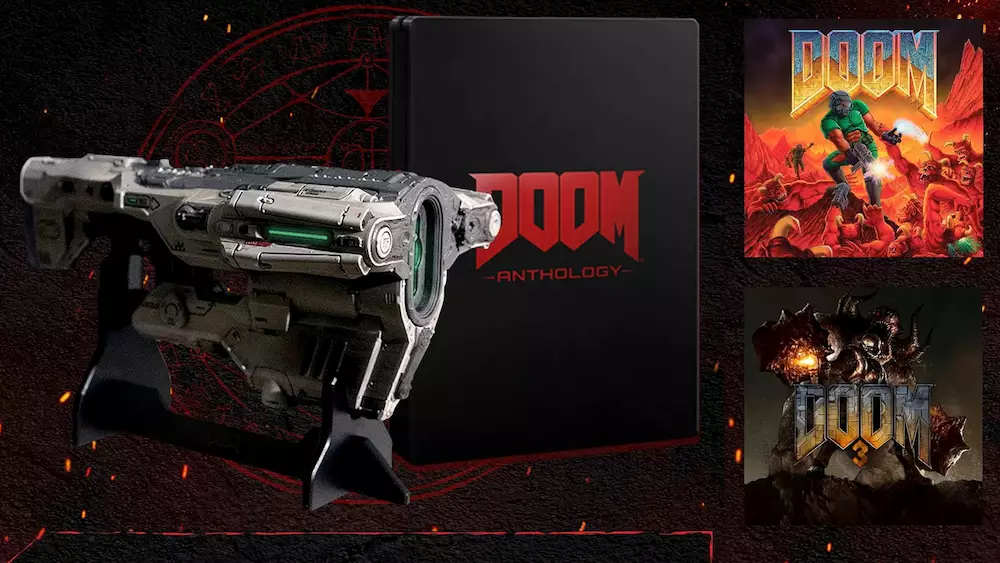The gaming landscape has consistently evolved, but few franchises have left a more significant mark than Doom. The recently released Doom Anthology is a testament to this legacy, now available on a variety of platforms including PlayStation, Xbox, Nintendo Switch, and PC. Priced at $80, this package encompasses six foundational Doom titles along with enticing physical collectibles, catering to both hardcore fans and newer players. While the anthology invokes nostalgia, it also raises questions about the shifting nature of gaming collections in a digital age.
For $80, players are treated to a comprehensive bundle that features six games: Doom (1993), Doom II, Doom 64, Doom 3, Doom (2016), and the Deluxe Edition of Doom Eternal. This selection not only encapsulates the evolution of Doom over nearly three decades but also offers a glimpse into the series’ innovative gameplay mechanics and design philosophies. One standout feature of the anthology is the five-inch replica of the BFG (Big F**king Gun), a staple of the franchise. This collectible, complete with LED lights and a display stand, targets the affections of longtime fans, adding a tangible element to the digital gaming experience.
However, with the steelbook casing included in the anthology, one can’t help but notice a significant oversight; the case holds no physical disc or cartridge, as the entire collection is digital. It’s an odd choice for a product that marks such an iconic series in gaming history, and it may leave some collectors feeling unfulfilled.
The Doom Anthology had a tumultuous launch. Announced in August and rapidly sold out during its pre-order phase on Amazon, the anticipation surrounding the collection is undoubtedly indicative of the franchise’s enduring popularity. This situation contrasts sharply with the recent release of the Fallout Special Anthology Edition, which has since been hard to find due to reselling issues. Doom Anthology, fortunately, is more widely available across platforms, allowing gamers to grab it on launch day.
Digital vouchers contained within the collection can be redeemed on platforms like Steam, PlayStation Store, Xbox Store, and Nintendo’s eShop. This digital-exclusive approach invites discussions about how gaming consumption is evolving; physical copies are becoming less prevalent as cloud technology and digital libraries gain traction.
The Doom Anthology not only serves as a throwback to classic gameplay but also embraces modern technology. The 1993 and 1994 versions of Doom received a remarkable visual upgrade, offering enhanced graphics that support 4K resolution and 120 frames per second on current consoles such as PS5 and Xbox Series X|S. Additionally, the inclusion of new content—26 multiplayer maps and a brand-new campaign episode—invites both seasoned players and newcomers to experience these classics in a fresh light.
Moreover, the anthology’s digital format allows for cross-play capabilities in multiplayer modes. The proliferation of online features highlights the ongoing transformation within gaming, offering a broader community experience even for titles that originated over two decades ago.
Looking ahead, excitement continues to build within the Doom community as “Doom: The Dark Ages,” a prequel to the 2016 reboot, is slated for a 2025 release. The anticipation for new stories in the Doom universe emphasizes the enduring legacy of the series. Even as nostalgia drives interest in collections like Doom Anthology, the commitment to innovation remains crucial for the franchise’s ongoing relevance.
Simultaneously, the impending launch of a new physical edition of the 1995 Super Nintendo port of Doom by Limited Run Games illustrates how the appetite for classic gaming experiences persists. Not only will this physical edition cater to collectors, but it will also bridge the gap between vintage gaming and modern expectations.
In an era increasingly dominated by digital media, the Doom Anthology strikes a peculiar balance between nostalgia and contemporary gaming. While its digital-only nature presents some challenges for collectors, the inclusion of beloved titles and notable physical extras makes it a commendable addition to the gaming shelf. Ultimately, this anthology not only invites audiences to relive the glory of Doom but also readies them for the next chapter in this legendary franchise. As gaming continues to change, titles like Doom Anthology remind us that true classics never truly fade away.

